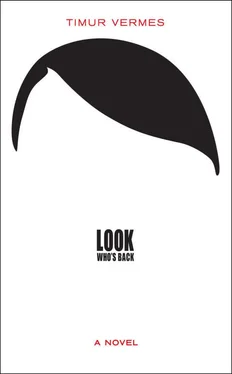Timur Vermes - Look Who's Back
Здесь есть возможность читать онлайн «Timur Vermes - Look Who's Back» весь текст электронной книги совершенно бесплатно (целиком полную версию без сокращений). В некоторых случаях можно слушать аудио, скачать через торрент в формате fb2 и присутствует краткое содержание. Город: London, Год выпуска: 2014, ISBN: 2014, Издательство: MacLehose Press, Жанр: humor_satire, на английском языке. Описание произведения, (предисловие) а так же отзывы посетителей доступны на портале библиотеки ЛибКат.
- Название:Look Who's Back
- Автор:
- Издательство:MacLehose Press
- Жанр:
- Год:2014
- Город:London
- ISBN:978-0-85705-292-6
- Рейтинг книги:4 / 5. Голосов: 1
-
Избранное:Добавить в избранное
- Отзывы:
-
Ваша оценка:
- 80
- 1
- 2
- 3
- 4
- 5
Look Who's Back: краткое содержание, описание и аннотация
Предлагаем к чтению аннотацию, описание, краткое содержание или предисловие (зависит от того, что написал сам автор книги «Look Who's Back»). Если вы не нашли необходимую информацию о книге — напишите в комментариях, мы постараемся отыскать её.
People certainly recognise him, albeit as a flawless impersonator who refuses to break character. The unthinkable, the inevitable happens, and the ranting Hitler goes viral, becomes a YouTube star, gets his own T.V. show, and people begin to listen. But the Führer has another programme with even greater ambition — to set the country he finds a shambles back to rights.
Look Who’s Back
Look Who's Back — читать онлайн бесплатно полную книгу (весь текст) целиком
Ниже представлен текст книги, разбитый по страницам. Система сохранения места последней прочитанной страницы, позволяет с удобством читать онлайн бесплатно книгу «Look Who's Back», без необходимости каждый раз заново искать на чём Вы остановились. Поставьте закладку, и сможете в любой момент перейти на страницу, на которой закончили чтение.
Интервал:
Закладка:
iii
The next few days and nights were to be a real test for me. Humiliated by my circumstances, billeted in makeshift accommodation, cheek-by-jowl with dubious publications, tobacco, confectionery and tinned drinks, at night bent double in a passably (but not particularly) clean armchair, I had to catch up on the past sixty-six years without arousing unfavourable attention. Whereas others would have no doubt spent hours and days fruitlessly agonising over scientific explanations, hunting in vain for a solution to this time-travel conundrum, which was as fantastical as it was unfathomable, my trusty methodical reasoning was well placed to adapt itself to the prevailing circumstances. Instead of wallowing in self-pity, I accepted the facts of the new situation and focused on reconnaissance. Especially as — to anticipate events briefly — the changed conditions seemed to offer considerably more and better opportunities. It transpired that in the last sixty-six years the number of Soviet soldiers on the territory of the German Reich had fallen substantially, particularly in the Greater Berlin area. The current figure was between thirty and fifty men; in a flash I could see that this afforded the Wehrmacht a far better prospect of victory compared to the last estimate from my general staff of around 2.5 million enemy soldiers on the Eastern Front alone.
I toyed, albeit momentarily, with the idea that I had been the victim of a plot, an abduction, in which the enemy’s intelligence service had concocted an elaborate hoax, circumventing my iron will to prise from me key secrets. But the technological demands of creating an entirely new world in which, after all, I could move about freely — that variation on reality was even more inconceivable than the one I found myself in, with the ability to grasp things with my hands and see with my eyes. No, I had to wage the struggle in this bizarre here and now. And the first step in any struggle is always reconnaissance.
The reader will not find it hard to imagine that obtaining new, reliable information without the necessary infrastructure posed considerable difficulties. The premises were extremely inauspicious: as far as foreign affairs were concerned, I had neither military intelligence nor the foreign ministry at my disposal; with regard to domestic affairs, establishing contact with the Gestapo was, given my circumstances, no simple matter. Even undertaking a library visit seemed too hazardous for the time being. I was thus reliant on the content of numerous publications, whose trustworthiness I was of course unable to verify, as well as on utterances and scraps of conversation from passers-by. The newspaper seller had very kindly supplied me with a wireless set, which on account of technological advances in the intervening years had shrunk to unbelievably tiny proportions; but the standards of Greater German radio had nosedived since 1940. As soon as I switched it on I heard a hellish din, frequently interrupted by utterly incomprehensible gibberish. I continued to listen, but the content never changed; the only difference was that it began to alternate more frequently between the racket and the gibberish. I made a number of futile attempts, each lasting several minutes, to decrypt the noise issuing from this technological marvel, then switched it off in horror. I must have sat there absolutely still for a quarter of an hour, virtually paralysed by shock, before deciding to postpone my efforts with the wireless. So I was left with the periodicals. It had never been their top priority to provide a true historical account; I was almost certain nothing had changed on that front.
An initial review, which could not, of course, provide a complete picture, pointed to the following conclusions:
1. The Turk had not come to our assistance after all.
2. In light of the seventieth anniversary of Operation Barbarossa, there were numerous reports about this episode in German history painting a negative picture of the campaign. The unanimous view was that Barbarossa had not been a victory; indeed, the whole war had ended in defeat, or so these papers said.
3. I was reported to be dead. They said I had committed suicide. In truth I do recall having discussed this contingency — purely theoretically — with my confidants, and my memory was definitely lacking a few hours of what had been a terribly difficult time. But, in the final analysis, I only needed look at myself to see the facts.
Was I dead?
We all know, of course, what to make of our newspapers. The deaf man writes down what the blind man has told him, the village idiot edits it, and their colleagues in the other press houses copy it. Each story is doused afresh with the same stagnant infusion of lies, so that the “splendid” brew can then be served up to a clueless Volk. In this instance, however, I was prepared to be somewhat lenient. So rarely does Fate intervene this strikingly in its own workings that even the smartest minds must find it difficult to comprehend, let alone the mediocre intellects serving our so-called opinion sheets.
4. My brain required the stomach of an ox to digest the other information I managed to unearth. One had to disregard the press’s miscalculations on matters military, historical, political — on every topic, in fact, including economics — the result of either ignorance or malicious intent; otherwise, faced with such reams of foolishness, a thinking person would simply go mad.
5. Or one would develop an ulcer from reading the scribblings of the syphilitic, degenerate minds within the gutter press who, manifestly freed from all state control, were at liberty to publish the sick and profane view of the world they had dreamed up.
6. The German Reich appeared to have given way to what was called a “Federal Republic”, the leadership of which resided with a woman (“Federal Chancellor”), although men had been entrusted with this position in the past.
7. Political parties existed again, with all the infantile, counter-productive squabbling this entails. Social Democracy, that ineradicable pest, was making merry mischief once more at the expense of the long-suffering German Volk. Other organisations were sponging off the wealth of the people in their own way; amazingly, perhaps, I found little appreciation of their “work”, not even in the dishonest press, which otherwise seemed so benevolent. By contrast, N.S.D.A.P. activity had ceased altogether. If one were to believe the view that the Reich had been defeated, it was possible the Party’s work had been impeded by the victorious powers. Alternatively, the organisation may have been driven underground.
8. The Völkischer Beobachter was not available everywhere; at least the kiosk belonging to this vendor — patently a radical liberal — did not have it on display. In fact he had no German-national publications for sale at all.
9. The Reich seemed to have shrunk, despite the fact that our neighbouring states were by and large the same ones. Even Poland was still there, living out its artificial existence unchecked, and partly on Reich territory! Now, I may be a level-headed man, but at this point I was unable to suppress my indignation; I found myself screaming out into the darkness of the kiosk, “I might as well have handed them the war on a plate!”
10. The Reichsmark was no longer legal tender, even though others — probably some clueless dilettantes on the side of the victorious powers — had clearly adapted my plan to turn it into a European-wide currency. At any rate, transactions were now being carried out in an artificial currency called “Euro”, regarded, as one would expect, with a high level of mistrust. I could have told those responsible that this would be the case.
11. A partial peace seemed to be in place, although the Wehrmacht was still at war. Now known as the “Bundeswehr”, it was in an enviable state, no doubt on account of the technological advances that had been made. If the statistics in the newspapers were to be believed, one would have to conclude that German soldiers in the field were practically invulnerable; these days casualties were few and far between. You can imagine my anguish when with a sigh I thought of my own tragic fate, of those bitter nights in the Führerbunker, hunched in grief as I brooded over maps in the operations room, battling a hostile world as well as Destiny herself. Back then, more than 400,000 soldiers bled to death on countless fronts, and that was in January 1945 alone. With this astonishing modern outfit there is no doubt I could have swept Eisenhower’s armies into the sea, and crushed Stalin’s hordes in the Urals and Caucasus like insects within just a few weeks. It was one of the few truly encouraging pieces of news that I read. With this new Wehrmacht the future conquest of Lebensraum in the north, east, south and west appeared as bright a prospect as it had with the old one. The consequence of recent reforms introduced by a young minister who must have been of the highest calibre, but who was forced to step down following a conspiracy hatched by resentful and small-minded university professors. Little seemed to have changed since my time, when once I had hopefully submitted my designs and drawings to the Vienna Academy. Devoured by envy, mediocrities continue at every turn to obstruct the lively genius who parades his talents undeterred. They cannot stomach the fact that his brilliance easily outshines the feeble glow of their own pitiful aura.
Читать дальшеИнтервал:
Закладка:
Похожие книги на «Look Who's Back»
Представляем Вашему вниманию похожие книги на «Look Who's Back» списком для выбора. Мы отобрали схожую по названию и смыслу литературу в надежде предоставить читателям больше вариантов отыскать новые, интересные, ещё непрочитанные произведения.
Обсуждение, отзывы о книге «Look Who's Back» и просто собственные мнения читателей. Оставьте ваши комментарии, напишите, что Вы думаете о произведении, его смысле или главных героях. Укажите что конкретно понравилось, а что нет, и почему Вы так считаете.












